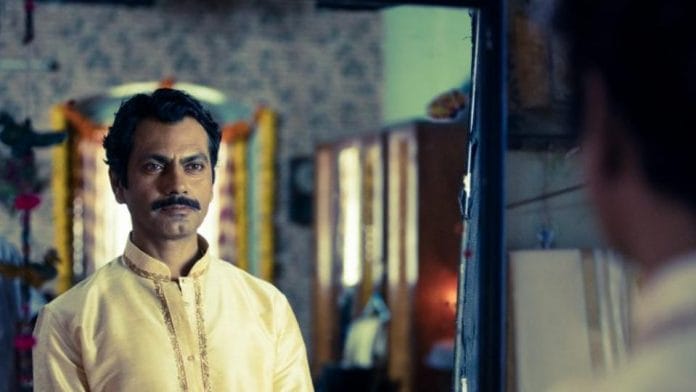Netflix finally allows Indian filmmakers the freedom to showcase their provocative politics without compromising on scale.
Gangster Ganesh Gaitonde (Nawazuddin Siddiqui) in ‘Sacred Games’, Netflix’s first Indian series and an adaptation of Vikram Chandra’s novel of the same name, primarily believes that he is god. It’s fitting because religion, the touch-me-not subject in Indian cinema landscape, is the central theme of this cops-and-gangster drama and someone has to play the almighty.
In the tight eight-episode series, Mumbai cop Sartaj Singh (Saif Ali Khan) must unearth the conspiracy behind Gaitonde’s final revelation before committing suicide – the city will be destroyed in 25 days. Although lacking a sense of urgency, writers Varun Grover, Smita Singh and Vasant Nath put both the leads, with separate tracks in past and present, through a maze of politics, intelligence, glamour and, of course, the Mumbai underworld.
Co-director Anurag Kashyap has tried for two decades now to film his politics with as much honesty as censorship would allow, including his last theatrical release Mukkabaaz. Showrunner Vikramaditya Motwane, also a co-director and co-producer, lets Kashyap loose with Gaitonde’s track.
In an unflinching portrayal of Gaitonde’s rise from a small-town kid who murders his mother to a maverick underworld don who burns the city to avenge his wife’s murder, Kashyap is more interested in the mechanics of religion fuelling Gaitonde’s rise. So much so that the series begins with his voiceover, “Bhagwan ko maante ho? Bhagwan ko lund fark nahi padta. (Do you believe in God? God doesn’t give a fuck).”
The freedom to talk about religion, especially in (realistically) crude language, has been afforded to the makers simply because of the platform. With situations, allegories and even episode names coming from mythological references, there is a palpable desire to break free from the clutches of official (and unofficial) censorship.
In its most brazen and blazing depiction, the show captures the rise of the current political behemoth in India – Hindutva. Tracing the missteps of the Congress governments as historical milestones, be it the Emergency or the Shah Bano case, the show finds a plausible account for the ascent of the Hindutva politics. And with throwaway, colourful remarks about Mahabharata and Ramayana, including the TV shows, there is a deliberate nature to the dialogue. Largely featured in Gaitonde’s track, Kashyap presents the impact of these events in the lives of his ensemble, including a terrific transgender character, with trademark grittiness. However, his staple black humour is nowhere to be found.
Motwane, who helms the Sartaj Singh track, focuses on the predictable nexus of cops, gangsters, film stars and politicians.
Mumbai, now a sub-genre in itself, is the most omnipresent character here. With obvious nods to the 1992 riots and 1993 blasts, the play on religion and its political use forms an important thread. In an interesting gamble, Gaitonde, who has a penchant for the surreal, finds his inner communal demon post the infamous bombings, which end up in his wife’s killing.
The two filmmakers, with polar opposite sensibilities, find rhythm, but not pace, in a unique collaboration, especially at a scale mostly unavailable to either. Ably performed by a well-cast ensemble, including credible turns by Khan and Siddiqui, the series has been stylistically shot in rich colours.
Nothing that has been shown here is all-too new for Indian audiences, except the frequent nudity, but the grime and provocation in tone and tenor reflects a certain liberty not found in publically screened films.
Streaming giant Netflix has mostly chosen to start with large-scale productions and intriguing subjects in newer markets. To acquire subscribers in these markets, it has chosen to go with material that may not find acceptance through conventional avenues. In some cases, it has run into troubles with local governments, like in Indonesia. Even in India, the government was earlier reportedly planning censorship for online players.
Sacred Games is a risky but ambitious bet for Netflix. In terms of quality, given the low-level competition it faces in India, the show might prove to be a terrific start as well. Indian filmmakers, however, stand to gain the most.
Access to audience in over 190 countries is only a (helpful) metric, but it’s the freedom to make content they want to, without commercial and censorship fears, that would really set filmmakers free. Motwane and Kashyap have set the bar high for their peers, launching the game for domination in Indian online content market.






